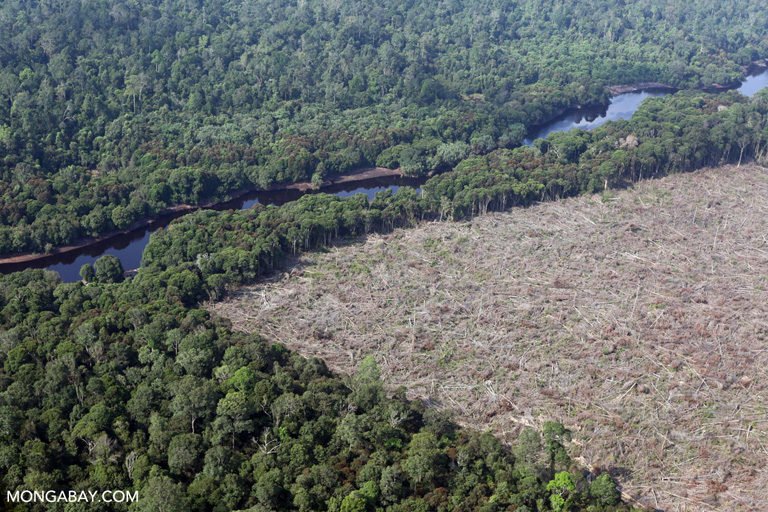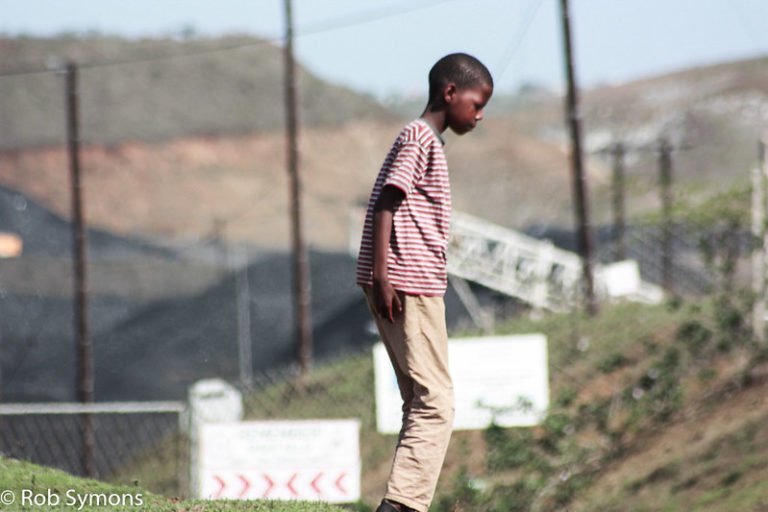- Palm oil companies across Southeast Asia are liable for the recovery of a Puerto Rico-sized area of forest because of their history of environmental harm, a new report shows.
- The Earthqualizer Foundation derived the figure of 877,314 hectares (2.17 million acres) based on the deforestation that the companies continued to carry out after they became aware that an increasing number of buyers had adopted sustainability policies.
- The report also calls on buyers who bought from these suppliers to shoulder some of the liability, which it said could count toward the forest restoration goals pledged by many of the buyers, including Nestlé, Kellogg’s and Unilever.
- The Earthqualizer report highlights some palm oil companies that are already undertaking recovery initiatives, but notes that these are few and far between, and any progress will need to be assessed over the long term.
JAKARTA — Commitments by palm oil producers in Southeast Asia not to deforest, clear peatlands, or use exploitative practices have helped the industry significantly reduce tropical forest loss. But many of these companies must still be held to account for their past deforestation, with a new report putting them on the hook for restoring an area of forest the size of Puerto Rico.
The Earthqualizer Foundation, an environmental consultancy based in Indonesia, the world’s top producer of palm oil, calculated the figure going back to Dec. 31, 2015 — a cutoff date by which time most palm oil companies were aware of their buyers’ purchasing policies with regard to sustainability and the consequent risk of being suspended if they failed to comply.
In a recently published report, Earthqualizer identified the total area of cleared forests and peatlands in these companies’ concessions from 2016 to 2021 as being 650,000 hectares (1.6 million acres). Peat areas counted as double, because of the far higher amounts of CO2 emissions that are emitted when they’re cleared, thus yielding a final figure of 877,314 hectares (2.17 million acres) for which the companies are liable, the report says.
The researchers also reached out to the concession owners identified in their analysis to give them the opportunity to verify the data.
“The industry will have to compensate for this area one way or another,” said Eric Wakker, senior policy adviser for Earthqualizer. To leave what he called a “forest positive legacy,” he said Earthqualizer was calling on the industry to commit to protecting and restoring 1 million hectares (2.5 million acres) of forest.
He added that restoration shouldn’t be limited to planting trees, but should also include protecting and/or managing the recovered forests. In the case of peat forests that were cleared, the concession owner should restore and protect peat forest, not other types of ecosystems.
Most of this recovery liability — nearly 600,000 hectares (1.48 million acres), or 68% of the total — is in Indonesia, followed by Malaysia with 29% and Papua New Guinea with 3%. Twenty-five of the 300 companies identified are responsible for 45% of all recovery liability across the region, according to the report.
Companies owned by a little-known Sumatran businessman named Sulaidy make up the corporate group with the greatest liability. Sulaidy has been linked to Indonesia’s billionaire Fangiono family, which owns the Singapore-listed First Resources conglomerate and FAP Agri, both major players in the palm oil industry.
According to the Earthqualizer study, Sulaidy’s eight oil palm plantations are liable for the recovery of nearly 35,000 hectares (86,500 acres) of land. Sulaidy-associated companies have also topped the list of palm oil deforesters for the past three years running, compiled by risk analysis consultancy Chain Reaction Research (CRR), with 6,390 hectares (15,790 acres) of forests cleared in 2021 alone.
In second and third spot in the Earthqualizer analysis are Indo Gunta and Sungai Budi Group, respectively, both with nearly 30,000 hectares (74,100 acres) of recovery liability.
These and the other companies identified in the report have a responsibility to remedy their past harms because that’s one of the criteria of “no deforestation, no peat and no exploitation” (NDPE) policies, according to Earthqualizer technical director Ihwan Rafina.
And while not all growers have adopted an NDPE policy, in most cases the buyers they sell to have done so, he added.
“When the buyers have NDPE policies, the growers are also tied,” and thus have a responsibility to recover the land, Ihwan told Mongabay.
Some signs of progress
Several companies have already launched recovery initiatives. The report cited KPN Plantation, formerly known as Gama until 2019, as one of the more progressive supplier groups with recovery plans.
KPN, one of the biggest palm oil growers in Indonesia, was among the first to commit to a recovery plan in 2018, when it was sanctioned with trade suspensions by many buyers. It plans to recover 11,900 hectares (29,400 acres) in the Indonesian provinces of West Kalimantan and Papua.
According to Earthqualizer, which works with KPN to monitor the implementation of the recovery plan, the company has consistently reported progress in the effort. Due to these corrective actions, Earthqualizer said, KPN has gradually been granted reentry back into most buyers’ supply chains.
Nevertheless, it’s still too early to declare KPN as a success story for recovery within the industry, because recovery takes a long time, Ihwan said.
“We need to see KPN’s case for the next five years, because [the recovery plan] is long term,” he said.
Even so, cases like KPN’s are few and far between, as efforts to recover deforested lands lag behind efforts to stop deforestation, Ihwan said. He noted there are fewer than 10 palm oil growers associated with the NDPE market that have made public commitments to recovery plans, accounting for roughly 56,000 hectares (138,400 acres) of land.
Now that deforestation rates associated with palm oil have come down, it’s time for more resources and efforts to be given to recovery, Ihwan said. These efforts need to come from traders and consumer good brands in particular, he added. Ihwan said it’s crucial for buyers to engage with suppliers that they previously dropped for not complying with the suppliers’ NDPE policies.
NDPE policies require these growers to commit to recovery plans before they can resume selling their palm oil to traders and consumer good brands with NDPE policies. But for less scrupulous growers, it’s easier to just sell their palm oil to buyers that don’t have NDPE policies — and this non-NDPE market, notably in China and India, is still significant, Ihwan said.
“Most of our palm oil is exported to China and India, and thus there’s still a lot of market for non-NDPE palm oil,” Ihwan said. He added the domestic market in Indonesia is another large non-NDPE market.
That makes it important for buyers with NDPE policies to engage with their dropped suppliers, Earthqualizer noted.
“Otherwise, problematic suppliers would be simply dropped whilst local communities and NGOs are left alone to address the problematic supplier,” it said.

Buyers also bear liability
Companies that bought palm oil from non-NDPE suppliers after the cutoff date should also shoulder some of the liability for the associated deforestation, Earthqualizer said.
“This past damage translates into commercial profit made in the global agri-commodities supply chain today,” it said.
The responsibility to engage with non-compliant suppliers are especially true for companies that are members of the Consumer Goods Forum’s (CGF) Forest Positive Coalition of Action, Ihwan said. The coalition consists of 21 of the world’s largest consumer goods companies — such as Unilever, Carrefour, Mars and Mondelēz International, who have all adopted NDPE policies in their commodity supply chains.
Ihwan said the coalition members haven’t yet embrace the notion that they bear some liability for this historical harm, as the coalition is still in the process of adding restoration to the definition of what it means to be “forest positive.”
“We want to see what their collective efforts are [on recovery],” he said. “There are companies like Unilever [in the coalition], but we haven’t seen much support [from them] to growers. Sometimes, [dropped] growers are working alone without clear guidelines [from buyers] on how to reenter the NDPE supply chain.”
Among the first things the coalition members could do is to publicly commit to help growers recover their concessions and engage in development of recovery plans, Earthqualizer said. In fact, the recovery of areas damaged by the palm oil industry could contribute to the global forest restoration and landscape rehabilitation goals pledged by major brands — such as Ferrero, General Mills, Kellogg’s, L’Oréal, Mondelēz, Nestlé, Procter & Gamble, and Unilever — in the 2014 New York Declaration on Forests.
The signatories, which include Ferrero, General Mills, Kellogg’s, L’Oréal, Mondelēz, Nestlé, Procter & Gamble, and Unilever, pledged to restore 350 million hectares (864 million acres) of degraded landscapes and forestlands — an area half the size of Australia — by 2030.
“We see this as an opportunity to reach the global restoration target of 350 million hectares,” Earthqualizer researcher Ibnu Budiman told Mongabay. “I’m sure Indonesia is also part of that commitment.”
It’s important that companies work on recovery, Earthqualizer said.
“The sector’s liability for past harm has now been documented and will not quietly disappear from the record. This outstanding debt will not settle itself,” Earthqualizer said.
“With tropical biodiversity already in rapid decline and global warming escalating year by year, market inaction will lead to ever rising interest rates on recovery debt. The oil palm industry will thus have to step up its commitment and action to settle its liability.”
Banner image: Deforestation for oil palm in Malaysia. Image by Rhett A. Butler/Mongabay.
FEEDBACK: Use this form to send a message to the author of this post. If you want to post a public comment, you can do that at the bottom of the page.












